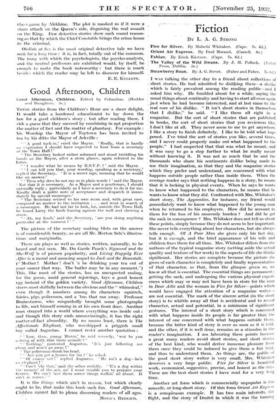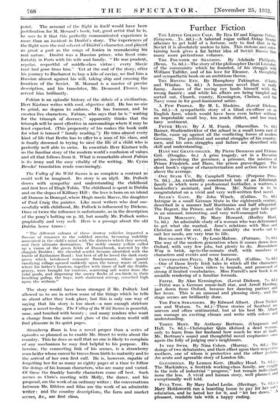Fiction
BY L. A. G. STRONG , The Valley of the Wild Swans. By J. H. Pollock. (Talbot
Press, Dublin. 5s.) Strawberry Roan. By A. G. Street. (Faber and Faber. 7s. 6d.)
; I was talking the other day to a friend about collections of short stories. He had admitted to disliking them—a dislike , which is fairly prevalent among the reading public—and I asked him why. He fumbled about for a while, saying the
usual things about continuity and having to start all over again , just when he had become interested, and at last came to the real core of his dislike. " It isn't short stories in themselves that I dislike," he said. "I like them all right in a ' magazine. But the sort of short stories that are published in books, the sort of short stories that you reviewers like, I don't like at all. They never seem to me to get anywhere.
I like a story to finish definitely. I ince to be told what hap. t pened. I've tried the sort of stories you like, several times, and I never could properly make out what happened to the people." I had suspected that that was what he meant, and it was easy to go a step further to what he really meant without knowing it. It was not so much that he and the thousands who share his sentiments dislike being made to use their imagination, as that they and the magazine stories which they prefer and understand, are concerned with what happens outside people rather than inside them. When the average reader says that nothing happens in a story, he means , that it is lacking in physical events. When he says he wants to know what happened to the characters, he means that he wants to know what they did. Confronted with Mrs. Whitaker's short story, The Apprentice, for instance, my friend would immediately want to know what happened to the young man when he returned to his employers. How did he account to them for the loss of his unseemly burden ? And did he get the sack in consequence ? Mrs. Whitaker does not tell us about • these points, simply because they do not seem to her important. She never tells everything about her characters, but she always , tells enough. Of A Poor Man she gives only his last day, but it is enough, and the brief appearance of his wife and children fixes them for all time. Mrs. Whitaker differs from the , authors of the typical magazine story (setting aside the actual quality and texture of her work) in the aspects .of life she thinks significant. Her stories are complete because the picture she gives of each character is completely and finally representative of that character, so that, from the glimpse given us, we • know all that is essential. The essential things are permanent : getting the sack, and undergoing the various physical experi- ences which may or may not have been in store for the man . in Dear Ailie and the woman in Five for Silver—points which • would have engaged the attention of a magazine writer— are not essential. The mark of the sincere artist (in the short story) is to whittle away all that is accidental and to reveal character, actual and potential, in a minimum of significant gestures. The interest of a short story which is concerned with what happens inside its people is far greater than the interest of one concerned with what happens outside them, because the latter kind of story is over as soon as it is told, and the other, if it is well done, remains as a stimulus in the reader's imagination. I am labouring these points because a great many readers avoid short stories, and short stories of the best kind, who would derive immense pleasure from them once they could be induced to give -them a fair trial. and thus to understand them. As things are, the public of the good short story writer is very small, Mrs. Whitaker deserves a very large public. Five for Silver is beautiful work, economical, suggestive, precise, and honest as the day. These are the best short stories I have read for a very long time.
Another art form which is commercially unpopular is the tunwelle, or long-short story. Of this form Orient Air Express is a conspicuous example. It has two main interests, the I flight, and the story Of Dmitri in which it was the turning
point. The account of the flight in itself would have been justification for M. Morand's book, but, good artist that he is, he sees to it that this perfectly communicated experience is more than an incident in Dmitri's story. The 'experiences Of the flight were the real solvent of Dmitri S character, and played
as great a part as the. songs of. Ionics in reasN-alrenink us real nature. Dmitri was a Russian prince, who lived coral
fortably in Paris with his wife and family. "He was pruderitt,, regular, respectful . of middle-class virtue ; ••every Slavic
trait had gone from him." • Yet at the end of the story, Vier his journey to Bucharest to buy a kilo of 'caviar; we- find him a Russian almost against his will taking ship and crossing. the frontiers of the Soviet. M. Morand is a master of precise description, and his translator, Mr. Desmond. Flower, has
served him brilliantly. . • . . .
Fabian is an episodichistory of the debris of a civilization. Herr Kostner writes with cool, objective skill. He has no axe to grind, no dogma to enforce.' He has humour, and he creates live characters. Fabian, who says that he is ." waiting for the triumph cif decency,". apparently thinks that the triumph will be most effective in•surroundings _where it May be
least expected. (This .propensity of his makes the book unfit for what is termed family reading.")- Hetries-almost every
kind of life that Berlin has to offer to a Mari` of his class, and is finally drowned in trying to sive the life Of achild Who is
perfectly well able to swim. In essentials Herr Kristner tells us the familiar story of the modern world's confusion of values• and all that follows from it. What is remarkable about Fabian is its irony and the easy vitality of the writing. Mr. Cyrus
Brooks' translation reads convincingly. ! • The Valley of the Wild Swans is as complete a contrast as could well be imagined. Its story is an idyll. Mr. Pollock draws with sympathy and understanding the childhoOd, and first love of Hugh Tobin. The childhood is spent in Dublin and on the slopes of Killiney Hill : the love is born on an island off Dtmcoe in Donegal, where Hugh meets Maeve, the daughter of Paul Craig the. painter. Like most writers who deal suc- cessfully with childhood, Mr. Politick is influenced by Dickens.
Once or twice the influence is unfortunate, as in the description of the pony's bolting on p. 32, but usually Mr. Pollock writes graphically and very well. Here is a passage about the old Dublin horse trains:
"The different colours of these drowsy vehicles imparted a flavour of romance to the cobbled streets, becoming indelibly associated in the child's mind with the districts which they served, and their ultimate destination.- The sickly canary yellow called up a vision of the green fields of Donnybrook, watered by the sluggish Dodder : the cheerful scarlet became -identified with the bustle of Rathmines Road : but best of all he loved the dark rusty green which betokened romantic Sandymount, whose quaint ramifying village opened suddenly upon the tawny waste of sand, where his father's hunters, together with those of half the Dublin gentry, were brought for exercise, scattering salt water from the tidal pools, and dispersing the snowy flocks of sea-birds in their headlong gallop, the boys, with shortened stirrup, crouched high upon the withers."
The story would have been stronger if Mr. Polk& had allowed us to see in action some of the things which he tells us about after they took place, but this is only one way of
saying that his story is too short—a rare enough. stricture upon a novel to-day. The Valley of the Wild Swans is peaceful, sane, and touched with beauty ; and many readers who walk
a change from the noise and glare of the modern world Will find pleasure in its quiet pages.
Strawberry Roan is less a novel -proper than a series of episodes so planned as to enable Mr. Street to write about the country. This he does so well that no one is likely to. complain of any mechanism he may find helpful to his purpose. His heroine, the connecting link of his scenes, is a strawberry roan heifer whose career he traces from birth to maturity and to the arrival of her own first calf. He is, however, capable of forgetting her for as many as eighty pages at a time to follow the doings of his human characters, who are many and varied. Of these the frankly bucolic characters come off best. Such scenes as Chris's meeting with Molly, the dance, and his proposal, are the work of an ordinary writer : the conversations between Mr. Dibben and Silas are the work of an admirable writer and the country descriptions, the farm and market scenes, &c., are first class.







































 Previous page
Previous page